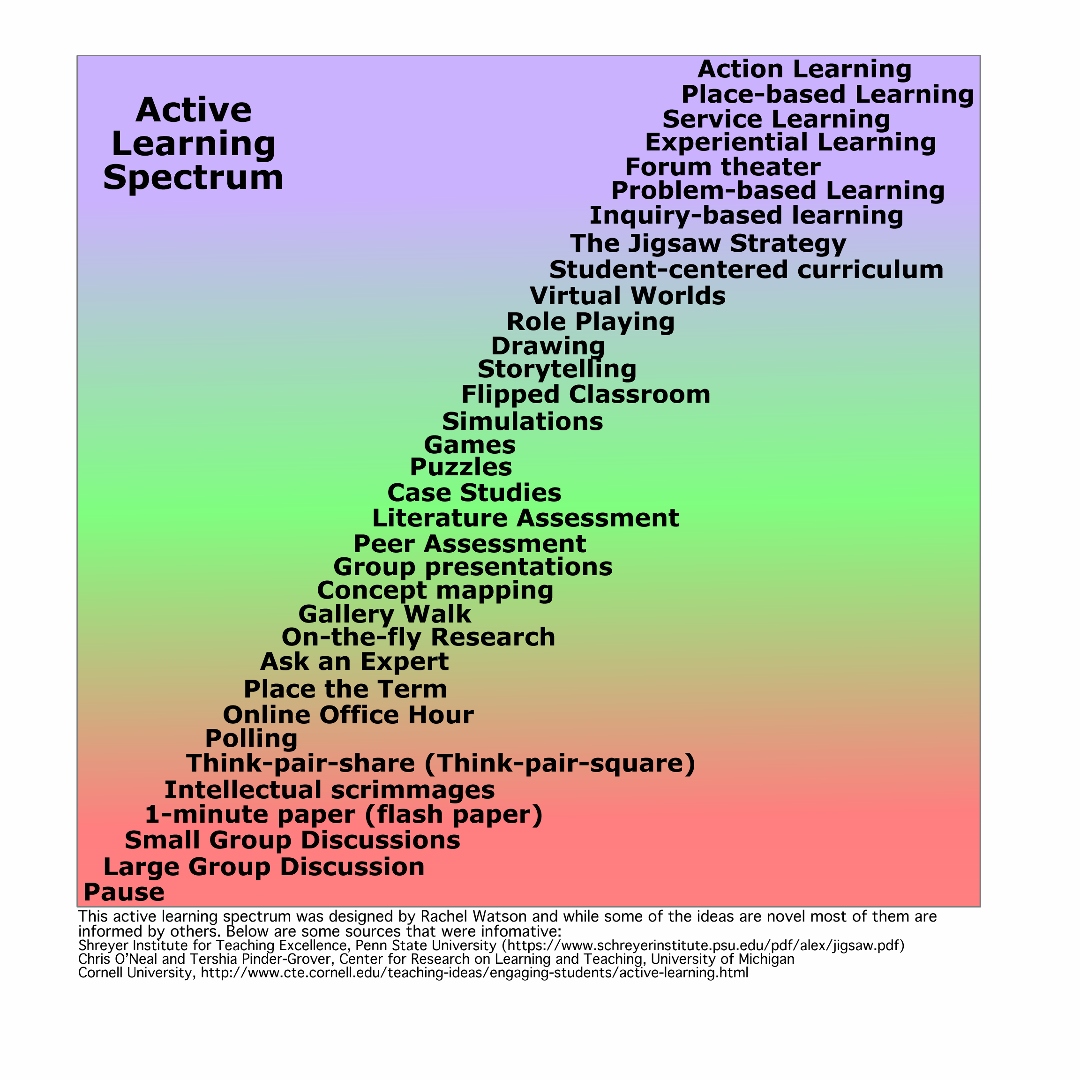Active Learning Spectrum

Active Learning Spectrum Short Definitions
Pauses: Purposeful use of pauses to emphasize important points and provide processing and questioning time
Large Group Discussion: Engaging the entire class in discussion surrounding a topic, question or problem
Small Group Discussions: Students groups (of ~5 or less) discuss a given topic, question or problem together
1-Minute Paper: 1 minute informal written (on a notecard for example) student responses to a given prompt or question
Intellectual scrimmages: Competitive team or individual game evaluating content understanding
Think-Pair-Share: Students are asked to think privately about a given question or problem before pairing with a neighbor or partner to discuss their answers. Finally, students share out to the entire class
Polling: Using technology or simpler way of displaying an answer to rapidly assess student understanding (& can then directly address misconceptions)
Online Office Hours: Alternative office hour forum providing additional access for students (i.e. women, non-traditional)
Place the Term: Given a term, students choose which category or group to place it in
Ask an Expert: Have a subject matter expert available via text or another technology for real-time class discussion
On-the-fly Research: Utilizing student cell phones &/or laptops to answer questions &/or find topic information
Gallery Walk: Student groups respond to given prompts (on large post-its or on the boards), discussing, writing responses and rotating to each prompt. Returning to the initial prompt, students summarize themes for the class.
Concept Mapping: Illustrating relationships between studied terms or concepts with connecting lines & phrases
Peer-Assessment: Students are asked to provide oral or written feedback to their peers
Case Studies: A real-life story or situation that encourages and allows students to explore/investigate issues related to a concept, often in effort to make a discovery or solve a case
Puzzles: Activities or games focusing on developing student problem-solving skills and creativity
Games: Potentially taking many different forms, educators provide an active instructional session for students that often requires concept application to earn points or improve ranking compared to other students or student groups
Simulations: Using an imitation or enactment (of something anticipated or in testing) to examine a concept
Flipped Classroom: Providing content material outside of class (i.e. through video) to allow for in-class activities
Role Playing: Students act out specific parts or situations to enhance concept understanding
Virtual Worlds: Computer-based simulated environment where student and instructor avatars interact (second life.com)
Student-centered curriculum: Educational programs, instructional strategies, and academic-support approaches intended to address the unique learning needs &/or cultural backgrounds of individual students and student groups
Jigsaw: Student groups are each given different but related topics and asked to collaborate to form expertise in their specific area, guided by leading questions and suggested resources. With knowledge gained, group members are split and reformed with one ‘expert’ in each group to teach their topic and learn from their peers.
Inquiry-based Learning: Student concept discovery and development through investigation (w/ leveled guidance)
Problem-based Learning: Students apply course concepts to describe and potentially solve a selected problem
Forum Theater: A tool for exploring & rehearsing possible actions that people can take to transform oppression
Experiential Learning: Knowledge, skill and value development from direct experiences often outside a traditional academic setting (i.e. internships, study abroad, undergraduate research, residency programs, etc.)
Service Learning: Applying course content to assist and provide a service for an organization, group or individual in need
Place-based Learning: Instruction outside the classroom relating course concepts to real-world applications
Action Learning: A small group working on real problems, taking action, learning as individuals and as a team
These terms pertain to the active learning spectrum and were defined by Kali Nicholas Moon (University of Wyoming), but informed by others, including: Rachel Watson (University of Wyoming), Chris O’Neal and Tershia Pinder-Grover (Center for Research on Learning and Teaching, University of Michigan), and Cornell University ( https://teaching.cornell.edu/teaching-resources/engaging-students/active-learning).

